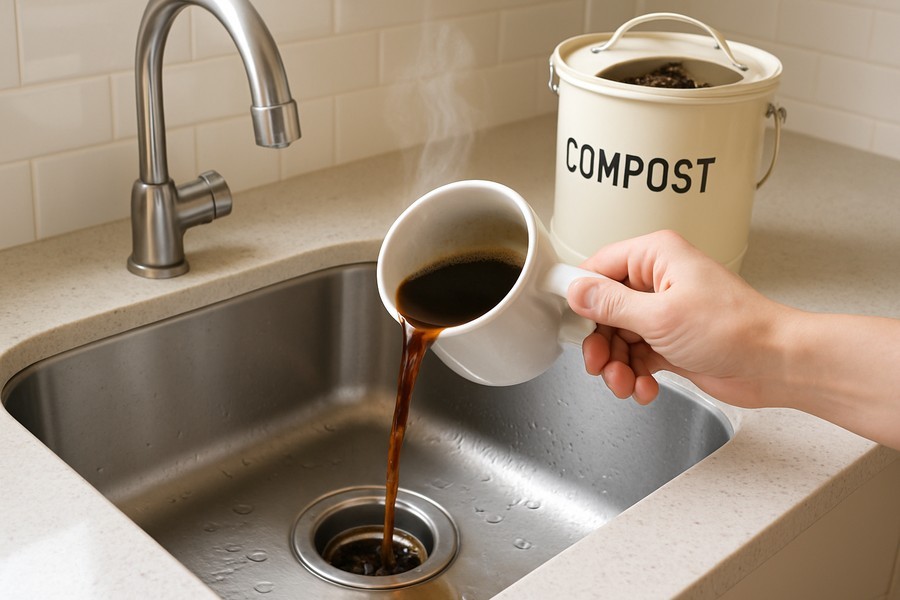
Is It Okay to Dump Coffee Down the Drain? Let's Hear From an Eco-Scientist
Imagine getting fined for dumping your leftover coffee down the drain? Sounds crazy, right? But that's what happened to a lady who was fined £150 by her local council for doing just that. Although the fine was later canceled, it sparked a fascinating debate about the environmental impact of such a seemingly trivial act.
Every day, an estimated 98 million cups of coffee are consumed in the UK alone, and an astounding 2 billion cups are drunk worldwide. That's a lot of coffee! And it all ends up somewhere - whether it's at home, at the office, or while you're catching a bus. While a dose of caffeine might be a delightful morning ritual for many, it might not be so delightful for our environment if not disposed of properly.
The Problem with Pouring Coffee Down the Drain
While one cup of coffee might not seem like a big deal, consider the cumulative effect of 98 million cups of coffee being tossed down the drain every single day. This could spell trouble for our rivers and water systems because it increases the caffeine levels that are already present due to household sewage.
Many areas in the UK have a combined sewerage system. In this system, a single pipe carries both rainwater from the streets and wastewater from homes to the sewage treatment plants. Any caffeine that enters these pipes could potentially bypass the treatment process and end up in our rivers.
Coffee is a complex concoction of hundreds of chemical compounds. Apart from caffeine, it often contains milk, sugar, and sometimes even cocoa, spices, and other ingredients. Of these, caffeine is the biggest environmental concern. It doesn't break down quickly or easily and is considered an emerging contaminant. In fact, as far back as 2003, caffeine was found to be polluting lakes and rivers in Switzerland.
But don't think that it's okay to dump decaf coffee down the drain. All coffee lowers the pH of water, and it also contains organic compounds that deplete oxygen levels in aquatic systems as they decompose. The nutrients in coffee can also promote algae growth, leading to further oxygen depletion in rivers and lakes. This can stress and potentially shorten the lifespan of marine plants and animals.
Why is Caffeine a Problem?
The capacity of wastewater treatment plants to treat and remove caffeine varies considerably - from 60% to 100%. This depends on factors like the type of treatment, plant design, season, temperature, and other elements. So even treated water can contain caffeine when it is returned to rivers and seas.
Heavy rainfall can exacerbate the problem if the capacity of sewage pipes is exceeded. When this happens, untreated wastewater is designed to divert directly into rivers and water courses. This prevents flooding of homes, businesses, and treatment plants with sewage. This means that whether it's from a street drain or toilets, some of the caffeine that we consume will eventually make its way into our rivers and aquatic environments.
And this isn't a problem just in the UK. It's a global issue. A study of 258 rivers in 104 countries found caffeine in over 50% of the sites sampled.
Recent studies have shown that caffeine can impact the metabolism, growth, and mobility of certain freshwater algae, plants, and aquatic fly larvae, potentially leading to their death. Even in small amounts, caffeine can have detrimental effects on marine and plant life.
What Should and Shouldn't You Put in a Drain?
Street drains are part of our water system. Anything that goes down a drain can end up in a river, lake, beach, or even the sea. Therefore, it's best not to dump anything down a drain that you wouldn’t want to see in these places.
So, things like coffee or coffee grounds, food-based liquids, oils, paint or hot fats, detergents, bleaches, liquids from building work, etc., should be disposed of via the appropriate household bins or waste collection centers. Let's allow the street drains to do their intended job: collecting rainwater, not wastewater.
Regrettably, due to the combined sewage system in the UK, there isn't much difference between disposing of liquids down your sink or into the street drain. So, remember that what's good for your street drain is also good for your kitchen sink, and ultimately, good for the environment. Plus, coffee grounds can easily block your kitchen sink.
How Should You Dispose of Your Coffee?
If you find yourself constantly discarding coffee, perhaps try making less coffee. At home, you could dilute coffee water for use as a plant tonic. Both coffee liquid and grounds can be disposed of in gardens or plant beds in small amounts, with caution.
While coffee grounds can contribute to the organic content of the soil, regular addition to the same patch of earth can cause a build-up of caffeine and solids, which can harm plants and soil function.
Alternatively, the best place for waste coffee is a compost heap or food waste recycling. If you don’t have access to these options, then put liquids or grounds into a container and put them in your bin.
